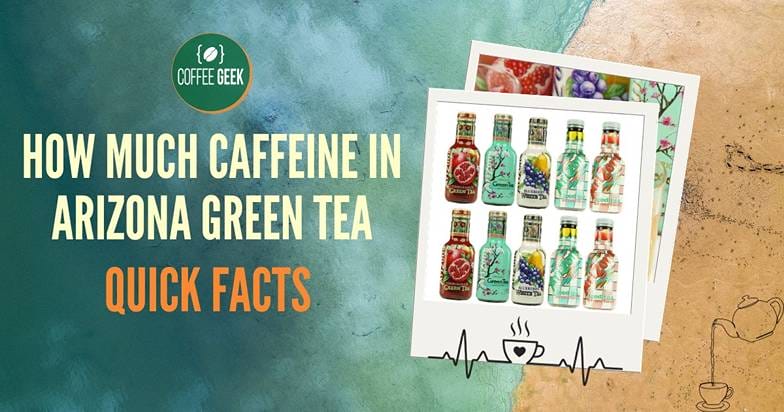Understanding the caffeine content of beverages you consume can be important for maintaining your health and well-being.
Arizona Green Tea is a popular ready-to-drink beverage, that offers a refreshing taste with the perk of containing caffeine.
Unlike the higher levels of caffeine found in coffee, the amount in Arizona Green Tea is significantly lower, which may be suitable for those looking to moderate their caffeine intake.
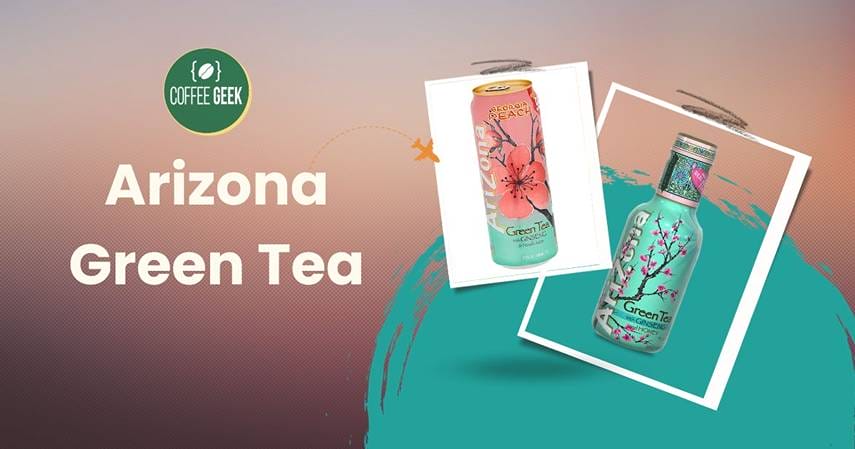
Arizona Green Tea provides a gentle energy boost compared to other caffeinated drinks on the market.
It can be a suitable alternative for consumers who are sensitive to high levels of caffeine but still enjoy the refreshing and stimulating effects that this mild stimulant provides.
For those monitoring caffeine consumption, knowing the exact amount in a beverage is key to balancing enjoyment with dietary concerns.
Key Takeaways
- Arizona Green Tea is lower in caffeine compared to coffee.
- The tea offers a milder energy boost suitable for caffeine-sensitive individuals.
- Knowing the caffeine content helps consumers balance enjoyment and health.
How Much Caffeine in Arizona Green Tea
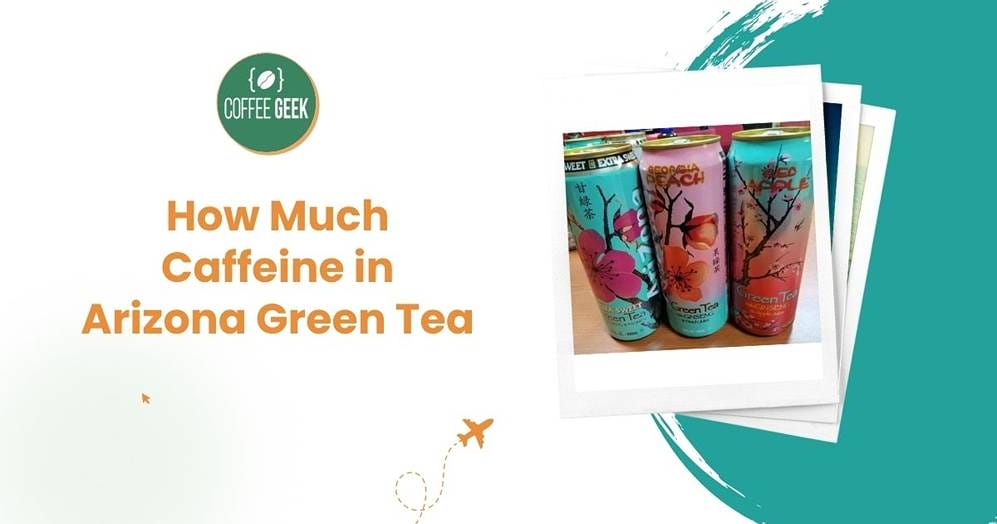
When you grab a can of Arizona Green Tea, you’re choosing a drink that has a lower caffeine content compared to many other caffeinated beverages.
A single serving, which is 8 ounces, generally contains about 7.5mg of caffeine. It’s a modest amount, especially when you compare it to a cup of coffee which can have 200mg or more.
If you often enjoy the full can, bear in mind that it’s not one but three servings—this means you’re consuming closer to 22.5mg of caffeine in total.
Despite its caffeine content, Arizona Green Tea can be a refreshing choice that provides a gentle energy boost.
Since caffeine stimulates the central nervous system, resulting in increased alertness, your moderate intake can help fend off that afternoon slump without overburdening your system.
Remember, “moderate” is key. While Arizona Green Tea is safe to enjoy, excessive caffeine consumption can lead to unwanted effects.
Always be mindful of how much caffeine you’re ingesting throughout the day from all sources, including coffee, tea, and energy drinks, to ensure you stay within a safe range.
Arizona Green Tea Overview
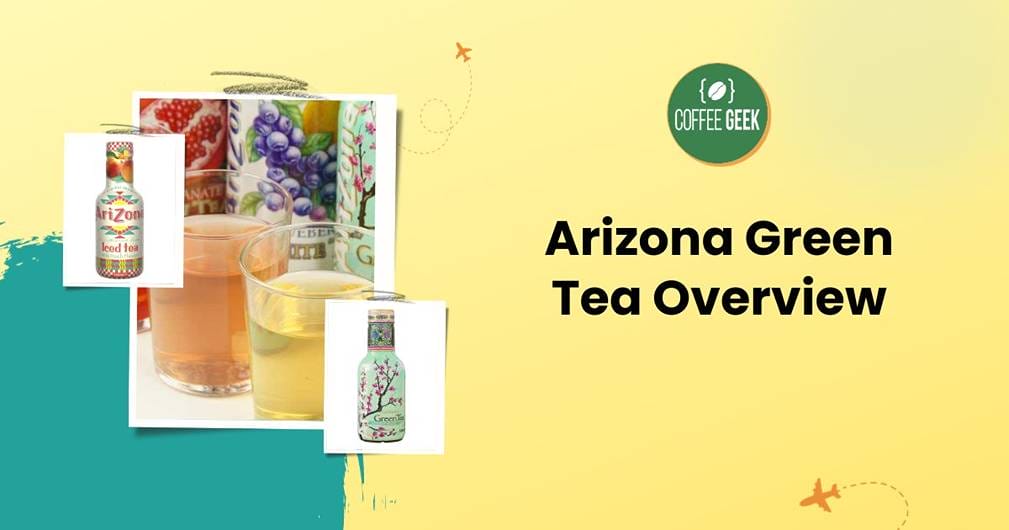
In this section, you’ll discover why Arizona Green Tea stands out in the beverage market, from its unique flavor to its specific blend of ingredients.
Explore the brand behind the drink, what makes it distinctive, and the composition that caters to your taste buds.
The Brand Arizona
Arizona Beverages began delighting consumers with its line of tea drinks in 1992.
Known for both their colorful packaging and wide array of flavorful drinks, Arizona is a brand that has become synonymous with ready-to-drink tea products.
Arizona Green Tea emerged as a flagship product, boasting not only great taste but also a stylish design that resonates with tea lovers of all ages.
What Makes Arizona Green Tea Unique?
What sets Arizona Green Tea apart is its signature blend of premium brewed green tea with just the right amount of ginseng and honey.
This combination provides a refreshing taste that’s both sweet and invigorating.
The use of ginseng not only adds a subtle kick but also aligns with popular wellness trends, making it a favorite among those seeking both flavor and function in their beverage choices.
- Sweeteners: Primarily honey and high fructose corn syrup
- Taste Profile: A perfect balance of sweetness with the natural taste of brewed green tea
Ingredients in Arizona Green Tea
The ingredients list of Arizona Green Tea reflects a straightforward approach to crafting a delicious, sweet tea experience.
The drink typically contains:
- Brewed green tea
- High fructose corn syrup (sugar)
- Honey
- Citric acid (for tartness)
- Natural flavors
- Ginseng extract
Importantly, the caffeine content in a standard can of Arizona Green Tea is relatively low compared to other caffeinated drinks, providing a gentle boost without the jitters typical of stronger caffeinated beverages.
Caffeine Content Analysis
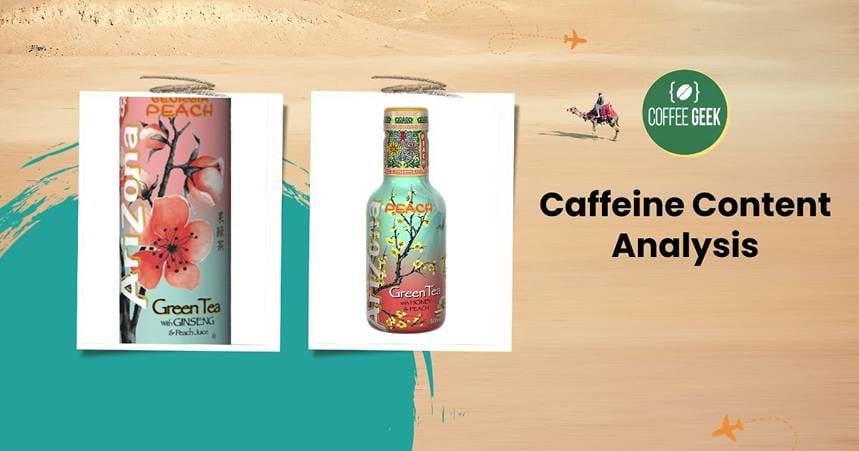
When you reach for a refreshing Arizona Green Tea, you might wonder about its caffeine content and how it compares with other popular drinks. Let’s dive in and look at the specifics.
How Much Caffeine Is in Arizona Green Tea?
Arizona Green Tea contains caffeine, but less than many other caffeinated beverages.
A single serving of 8 ounces has approximately 7.5 to 30 milligrams of caffeine, depending on various factors including brewing time.
If you drink a standard 23-ounce can, you’ll ingest about 22.5 to 69 milligrams of caffeine.
Keep in mind serving sizes when tracking your intake.
Comparison with Other Teas and Beverages
Compared to other teas, such as black tea and white tea, green tea—including Arizona’s version—tends to have a lower caffeine content.
Black tea can have up to 60-90 milligrams per 8-ounce serving, while white tea often contains around 15-30 milligrams per 8-ounce serving.
Now, let’s look at beverages outside the tea category:
- Cola: A typical 12-oz cola can have between 30-40 milligrams of caffeine.
- Energy Drinks: These can significantly surpass the caffeine levels found in teas, with a 16-ounce serving often containing 70 to over 200 milligrams of caffeine.
Remember, the actual caffeine content in any beverage can vary based on preparation and specific brand formulations.
So, if you’re monitoring your caffeine intake for the day, keep these numbers in mind as you decide what to drink.
Health Considerations
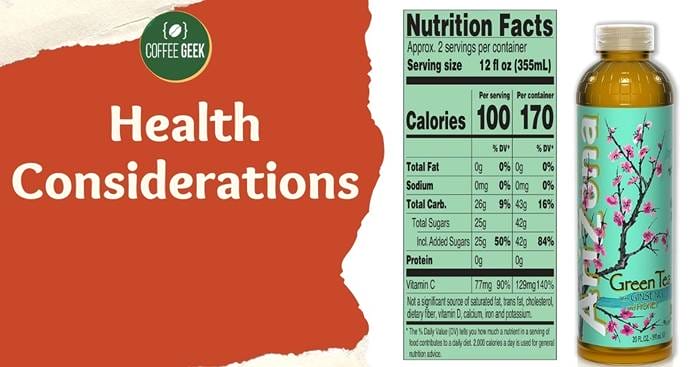
When considering your tea choices, understanding the health implications of caffeine is crucial. Let’s explore how a moderate amount of caffeine, like what you’d find in Arizona Green Tea, can affect your health.
Benefits of Moderate Caffeine Intake
Moderate caffeine consumption has been associated with several health benefits. For instance, it can improve your mental alertness and provide a short-term boost in concentration.
Furthermore, caffeinated beverages that are rich in antioxidants, such as green tea, can contribute positively to your diet.
Green tea also contains L-theanine, an amino acid that can promote relaxation without drowsiness.
Risks of Caffeine Overconsumption
However, it’s important to approach caffeine intake with caution. Consuming caffeine in excess can lead to negative health effects, such as jitteriness, insomnia, and heart palpitations.
Severe overconsumption can even lead to a caffeine overdose, which could impact your liver health and increase the risk of other medical issues.
It’s essential you stay within safe limits and consider decaf options if you’re sensitive to caffeine.
Caffeine’s Impact on Diet and Health
Caffeine’s role in your diet can have varied implications for your health. It’s not just about the caffeine—it’s about what comes with it.
Some tea drinks have high sugar content, which could affect your enamel and overall calorie intake.
Balancing your diet with low-caffeine options and ensuring you consume beverages in moderation will help you maintain a healthy lifestyle.
Tea Varieties and Brewing
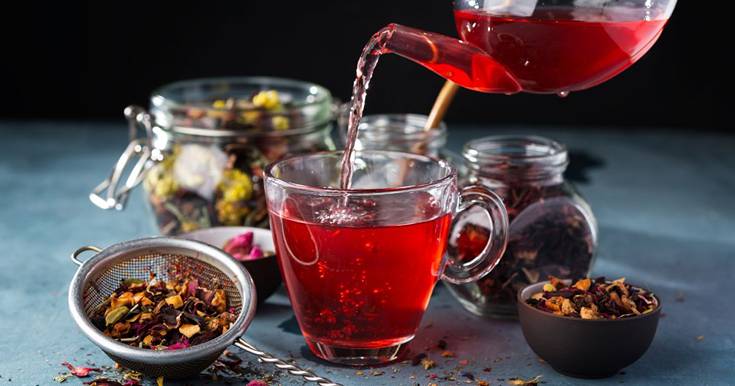
When exploring different types of tea, it’s essential to know that their caffeine content can vary significantly. Moreover, the way you brew your tea can also impact the caffeine level in your cup.
Types of Tea and Their Caffeine Levels
Green Tea: You’ll find that green tea, including popular brands like Arizona Green Tea, contains lower caffeine amounts compared to black tea. Typically, an 8 fl oz serving has about 7.5 mg of caffeine.
Black Tea: Your cup of black tea has more caffeine, generally ranging between 40-70 mg per 8 fl oz serving.
White Tea: White tea offers a delicate flavor with caffeine levels usually lower than green tea, often around 15-30 mg per serving.
Matcha Green Tea: This specially prepared form of green tea has a higher caffeine content, as you consume the actual tea leaves in powdered form.
An 8 fl oz serving can contain as much as 70 mg of caffeine.
The Brewing Process and Its Effect on Caffeine Content
Brewing time plays a pivotal role in determining the caffeine content of your tea.
Short Brew: Steeping tea for about three minutes often results in moderate caffeine extraction.
Longer Brew: Leaving your tea to brew for longer periods can significantly increase the caffeine level.
Remember, though, that the type of tea leaves and the temperature of the water you use are also critical in this process.
Brewed tea from loose leaves typically has more caffeine than tea bags due to the greater surface area of leaves exposed to water.
Your personal brewing style will ultimately dictate the caffeine content of your tea.
Exploring Different Brands and Products
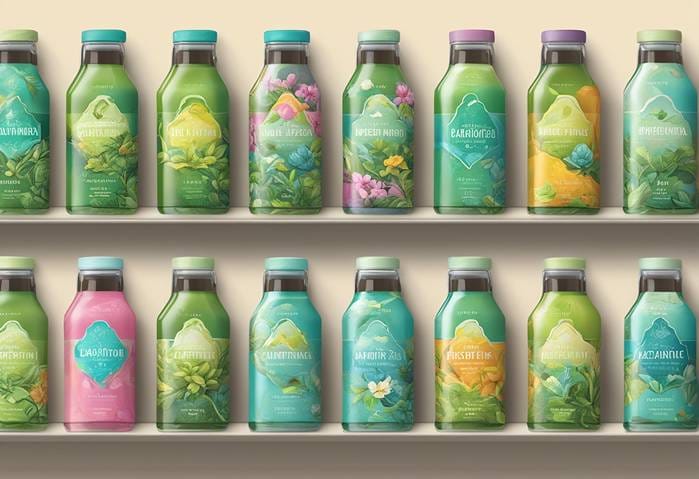
When you’re curious about the caffeine content in green teas, it’s helpful to compare popular brands and consider their various products.
Let’s look at how Arizona stands against other brands and what to expect from flavored and specialty offerings.
Comparing Arizona to Other Tea Brands
Arizona Green Tea offers a milder caffeine kick compared to other brands, with only about 15mg of caffeine in a standard 23-ounce can.
In contrast, traditional tea brands like Lipton and Tazo can vary in caffeine content, with some options going as high as 35mg per bag.
For instance, Lipton Brisk Green Tea provides a more pronounced energy boost, while Tazo’s green tea selections sit closer to Arizona’s range.
Snapple Green Tea and Sobe Green Tea are other competitors, where the caffeine content can differ but typically falls within a similar bracket.
- Arizona Green Tea: 15mg caffeine/23oz can
- Lipton Green Tea (standard bag): Up to 35mg caffeine
- Tazo Green Tea: Similar to Arizona’s caffeine range
- Snapple Green Tea: Varies by product
- Sobe Green Tea: Comparable to Arizona
Flavored and Specialty Green Teas
For a twist on the traditional, Arizona offers flavored green teas, such as ginseng and honey, which still contain a manageable caffeine content.
However, other brands like Nestea take a fruity turn with options like Nestea Peach Green Tea.
The flavored varieties generally follow the same caffeine guidelines, yet subtle differences can occur based on additional ingredients.
- Arizona Ginseng and Honey Green Tea: Moderate caffeine
- Nestea Peach Green Tea: Similar to original green tea caffeine levels
Specialty green tea products such as the Caribou Green Tea Smoothie can offer a different experience in both taste and caffeine content, often lower than the hot tea alternatives.
These beverages are tailored for those who appreciate the green tea flavor without a substantial caffeine intake.
- Caribou Green Tea Smoothie: Lower caffeine levels compared to hot teas
When broadening your tea horizons, be mindful of brand and product differences, not only for the taste but for your caffeine expectations.
Consumer Insights

When opting for Arizona Green Tea, you’re likely considering not only the flavor but also its caffeine content.
Your awareness of what’s in your drink can greatly influence your choice, so let’s dive into the specifics.
Review of Consumer Preferences and Trends
You may have noticed a growing trend where consumers like you are increasingly mindful of the ingredients within their beverages.
Specifically, many of you are actively seeking products that contain moderate amounts of caffeine and lower sugar levels.
It seems you’re keen on enjoying the refreshing taste of Arizona Green Tea, but also want to keep an eye on your daily caffeine and sugar intake.
Review platforms and social media insights reveal a preference for clear labeling that helps in making informed decisions.
Understanding Labels and Caffeine Measurements
Reading labels can be tricky, yet it’s crucial for you to understand exactly how much caffeine you’re consuming.
Arizona Green Tea labels indicate that an 8-ounce serving of Arizona green tea contains only 7.5 milligrams of caffeine, while an entire can has 22.5 milligrams.
This tea contains less caffeine than coffee, which may lead you to choose this tea as a decaffeinated alternative.
However, it’s worth noting that this still means there is some caffeine present, albeit in moderate amounts.
Be mindful of preservatives listed as well, as you might be looking for more natural options.
Cultural and Global Perspectives
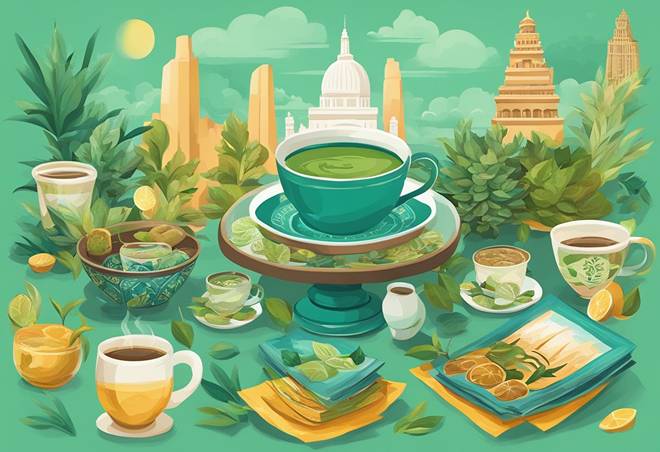
In exploring the caffeine content of Arizona Green Tea, it’s fascinating to see how tea is intertwined with various global cultures and consumption patterns.
Your understanding of this popular beverage will deepen as you learn about its cultural significance and how it’s enjoyed around the world.
Tea’s Role in Different Cultures
Japan: In Japan, tea is more than just a drink; it’s an integral part of the culture.
Matcha, a finely ground powder made from green tea leaves, is at the heart of the traditional Japanese tea ceremony, which is a choreographed art that emphasizes presence and mindfulness.
Arizona Green Tea, with its caffeine content, offers a more casual way to enjoy the flavors that originated from these age-old Japanese practices.
China: Often considered the birthplace of tea, China has a vast array of regional teas and a rich history of tea culture dating back thousands of years.
While green tea is widely consumed, red tea – known as black tea in the West – is also popular. Each region has its own preferred blends and methods of preparation, influencing how the world perceives and consumes tea.
Global Consumption Patterns of Caffeinated Teas
When you look at global consumption patterns, it’s clear that caffeinated teas, including Arizona Green Tea, are enjoyed in varied ways across different regions.
For instance, while some countries favor stronger, more robust black teas, others have a preference for the more subtle and lower caffeine options such as green tea.
- Global Preferences:
- In the United States, iced teas like Arizona Green Tea are commonly consumed for their convenience and refreshing qualities.
- Across Europe, there is a prominent culture around tea drinking, with preferences ranging from black teas to lighter green teas.
- Trends:
- The modern global market is continually seeking innovative flavors and blends, merging traditional tea cultures with contemporary tastes.
- Health-conscious trends have boosted the popularity of green teas due to their perceived benefits and lower caffeine content compared to coffee or black teas.
By looking at these cultural contexts and patterns, you’ll get a sense of how Arizona Green Tea fits into the larger global tapestry of tea consumption.
| Product | Caffeine Content |
|---|---|
| Arizona Green Tea (16 oz) | 15-20 mg |
| Arizona Green Tea (23 oz) | 25-30 mg |
| Arizona Green Tea (42 oz) | 40-45 mg |
| Arizona Green Tea (128 oz) | 90-100 mg |
Conclusion
Arizona Green Tea, produced by the Arizona Beverage Company, founded by John Ferolito and Don Vultaggio, is a popular choice among tea lovers.
Each 8 oz cup of this authentic green tea contains 7.5mg of caffeine, making it a good source of caffeine, especially for those who prefer a milder caffeine boost compared to stronger drinks like coffee.
The caffeine content in Arizona Green Tea is significant but not overwhelming, with approximately 7.5mg of caffeine per 8 fl oz serving.
This amount is considerably less than the caffeine found in a typical cup of coffee, which can contain around 95 mg of caffeine.
The natural source of Arizona Green Tea caffeine content comes from real green tea leaves, so this tea does contain real green tea leaves, making it a healthier alternative to some other caffeinated beverages.
When comparing Arizona Green Tea vs other caffeinated drinks, particularly coffee, it’s evident that green tea contains less caffeine.
This makes it an ideal choice for those who are sensitive to caffeine or wish to avoid a caffeine crash.
The brand’s focus on including green tea in its blend assures consumers that they are getting a natural and authentic product.
The Arizona Green Tea’s caffeine content per serving is modest, ensuring that it can provide a gentle caffeine boost without the risk of overconsumption.
For those who drink coffee regularly, switching to Arizona Green Tea can be a good way to reduce their caffeine intake while still enjoying a refreshing, flavorful beverage.
In summary, Arizona Green Tea is a natural and flavorful option for those seeking a beverage that provides a moderate level of caffeine.
With the fact that tea contains only 7.5 mg of caffeine per 8 oz serving, it stands as a healthier choice compared to many bottled juices and teas available in the market.
Its blend of green tea offers not just a delightful flavor but also a good source of antioxidants, catering to health-conscious consumers who are aware of the caffeine content in their beverages.
Frequently Asked Questions
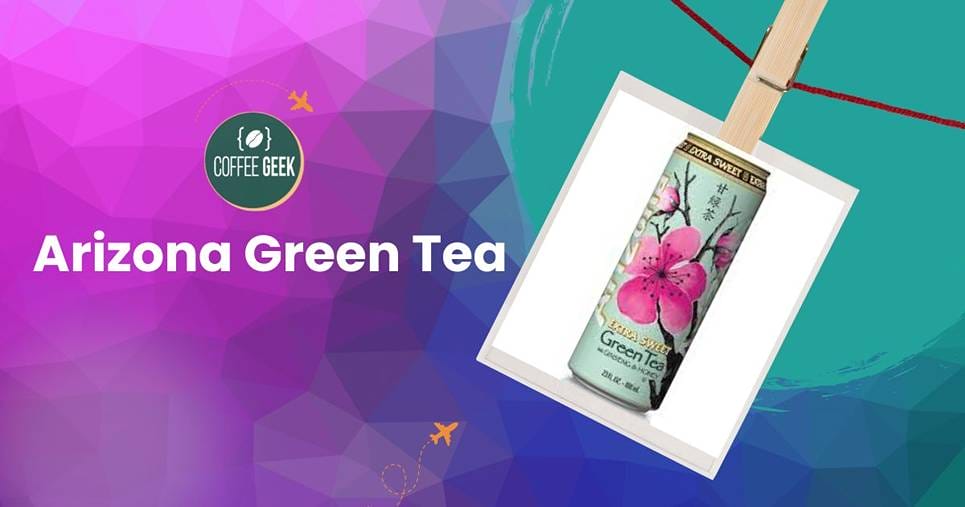
You’re likely curious about the caffeine content in Arizona tea products and how it might affect your health. Let’s explore some of your top questions on this topic.
How much caffeine can you typically find in a bottle of Arizona Iced Tea with Lemon?
A standard bottle of Arizona Iced Tea with Lemon contains 15 mg of caffeine in a 16-ounce serving size.
What are the health benefits or risks associated with drinking Arizona Green Tea?
Drinking Arizona Green Tea might offer some antioxidants benefits, but excess consumption could lead to caffeine-related side effects, such as jitteriness and disturbed sleep, especially if you’re sensitive to caffeine.
Is the Arizona Hard Green Tea variety free of gluten?
Arizona Hard Green Tea is a different product that may contain gluten due to the distillation process of alcoholic beverages.
Does the Arizona Raspberry Tea variety contain any caffeine?
Yes, Arizona Raspberry Tea does contain caffeine, although it generally has less caffeine compared to their green tea, at around 10 mg per 8-ounce serving.
Can you compare the caffeine content of Arizona Half and Half Tea to other caffeinated beverages?
Arizona Half and Half Tea typically has less caffeine than a standard cup of coffee but more than decaffeinated beverages. An 8-ounce serving contains approximately 15 mg of caffeine.
How does the caffeine content in a 20 oz bottle of green tea compare to other Arizona tea products?
A 20 oz bottle of Arizona Green Tea has about 30 mg of caffeine, which is relatively low compared to some of their other tea products like the Energy varieties, which typically have higher caffeine content.

